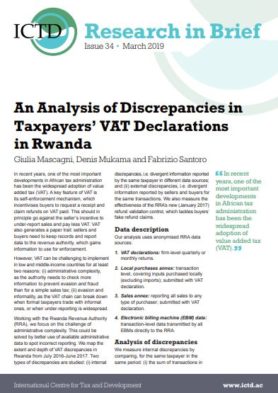Research in Brief 34
In recent years, one of the most important developments in African tax administration has been the widespread adoption of value added tax (VAT). A key feature of VAT is its self-enforcement mechanism, which incentivises buyers to request a receipt and claim refunds on VAT paid. This should in principle go against the seller’s incentive to under-report sales and pay less VAT. VAT also generates a paper trail: sellers and buyers need to keep records and report data to the revenue authority, which gains information to use for enforcement. However, VAT can be challenging to implement in low and middle-income countries for at least two reasons: (i) administrative complexity, as the authority needs to check more information to prevent evasion and fraud than for a simple sales tax; (ii) evasion and informality, as the VAT chain can break down when formal taxpayers trade with informal ones, or when under-reporting is widespread. Working with the Rwanda Revenue Authority (RRA), we focus on the challenge of administrative complexity. This could be solved by better use of available administrative data to spot incorrect reporting. We map the extent and depth of VAT discrepancies in Rwanda from July 2016-June 2017. Two types of discrepancies are studied: (i) internal discrepancies, i.e. divergent information reported by the same taxpayer in different data sources; and (ii) external discrepancies, i.e. divergent information reported by sellers and buyers for the same transactions. We also measure the effectiveness of the RRA’s new (January 2017) refund validation control, which tackles buyers’ fake refund claims. This ICTD Research in Brief is a two-page summary of ICTD Working Paper 92 by Giulia Mascagni, Denis Mukama and Fabrizio Santoro.
